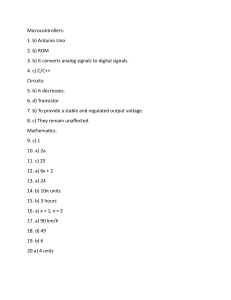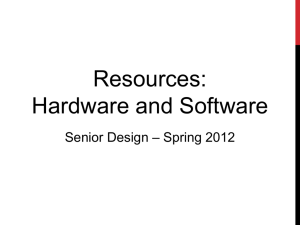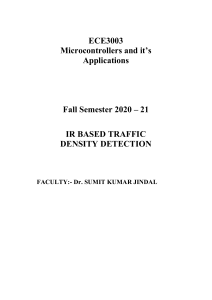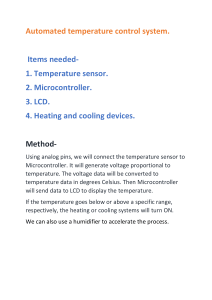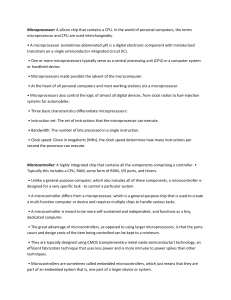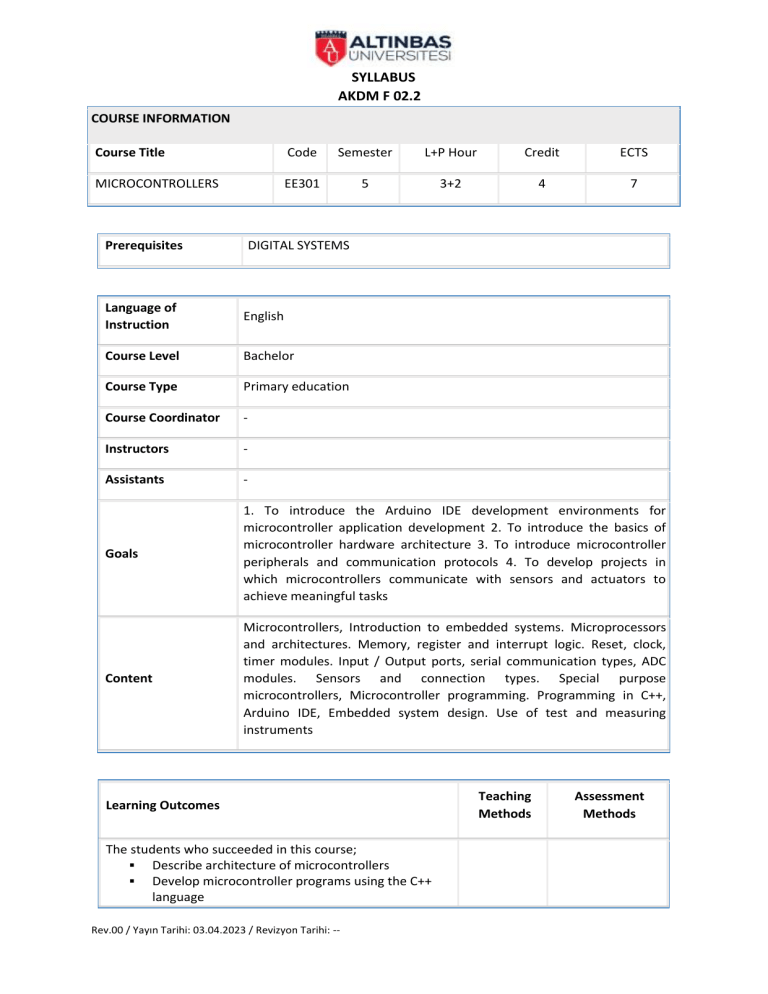
SYLLABUS AKDM F 02.2 COURSE INFORMATION Course Title Code Semester L+P Hour Credit ECTS MICROCONTROLLERS EE301 5 3+2 4 7 Prerequisites DIGITAL SYSTEMS Language of Instruction English Course Level Bachelor Course Type Primary education Course Coordinator - Instructors - Assistants - Goals 1. To introduce the Arduino IDE development environments for microcontroller application development 2. To introduce the basics of microcontroller hardware architecture 3. To introduce microcontroller peripherals and communication protocols 4. To develop projects in which microcontrollers communicate with sensors and actuators to achieve meaningful tasks Content Microcontrollers, Introduction to embedded systems. Microprocessors and architectures. Memory, register and interrupt logic. Reset, clock, timer modules. Input / Output ports, serial communication types, ADC modules. Sensors and connection types. Special purpose microcontrollers, Microcontroller programming. Programming in C++, Arduino IDE, Embedded system design. Use of test and measuring instruments Learning Outcomes The students who succeeded in this course; Describe architecture of microcontrollers Develop microcontroller programs using the C++ language Rev.00 / Yayın Tarihi: 03.04.2023 / Revizyon Tarihi: -- Teaching Methods Assessment Methods SYLLABUS AKDM F 02.2 Use inputs and outputs to use peripheral devices Compose communication signals with external systems Design basic embedded systems in terms of hardware and software Teaching Methods: Midterm Exam 20% Assessment Methods: Project 20% (If Project fails, courses fails) Lab Applications 20% Final Exam 40% Rev.00 / Yayın Tarihi: 03.04.2023 / Revizyon Tarihi: -- SYLLABUS AKDM F 02.2 COURSE CONTENT Week Topics Study Materials 1 Introduction (features of microcontrollers, usage areas, types, special purpose controllers: Arduino, ESP32 etc.) 2 Microcontroller core architecture (ROM, Flash, RAM, EEPROM, registers, reset, clock, interrupts) 8-bit AVR® Microcontrollers, http://microchipdeveloper.com/8avr:start 3 Microcontroller core architecture (ROM, Flash, RAM, EEPROM, registers, reset, clock, interrupts) 8-bit AVR® Microcontrollers, http://microchipdeveloper.com/8avr:start 4 Introduction to microcontroller programming Programming Arduino: Getting Started with with C++ Peripherals Sketches, Simon Monk, 2nd Ed. McGraw-Hill, 2016 5 Introduction to microcontroller programming Programming Arduino: Getting Started with with C++ Peripherals Sketches, Simon Monk, 2nd Ed. McGraw-Hill, 2016 6 Introduction to microcontroller programming Programming Arduino: Getting Started with with C++ Peripherals Sketches, Simon Monk, 2nd Ed. McGraw-Hill, 2016 7 Introduction to microcontroller programming Programming Arduino: Getting Started with with C++ Peripherals Sketches, Simon Monk, 2nd Ed. McGraw-Hill, 2016 8 Midterm Exam Lecture Notes, Recommended Books 9 Microcontroller Input/Output (GPIO, ADC, PWM) 8-bit AVR® Microcontrollers, http://microchipdeveloper.com/8avr:start Communication Protocols (UART, SPI, I2C) 8-bit AVR® Microcontrollers, http://microchipdeveloper.com/8avr:start Sensors Programming Arduino: Getting Started with Sketches, Simon Monk, 2nd Ed. McGraw-Hill, 2016 Actuators Programming Arduino: Getting Started with Sketches, Simon Monk, 2nd Ed. McGraw-Hill, 2016 13 Communication Peripherals (ESP8266 WiFi, HC-05 Bluetooth) Lecture Notes, Recommended Books 14 Communication Protocols (HTTP, MQTT) Kolban’s Book on ESP8266, Leanpub, 2016 10 11 12 Rev.00 / Yayın Tarihi: 03.04.2023 / Revizyon Tarihi: -- Lecture Notes, Recommended Books SYLLABUS AKDM F 02.2 15 Final Exam Lecture Notes, Recommended Books RECOMMENDED SOURCES Programming Arduino: Getting Started with Sketches, Simon Monk, 2nd Ed. McGraw-Hill, 2016 Programming with MicroPython: Embedded Programming with Microcontrollers and Python, Nicholas H. Tollervey, O'Reilly Media, 2017 Textbook 1. C++ How to Program (Early Objects Version), Global Edition, 10/E, Paul J. Deitel and Harvey Deitel, Pearson, 2016 Additional Resources 2. 8-bit AVR® Microcontrollers, http://microchipdeveloper.com/8avr:start 3. Kolban’s Book on ESP8266, Leanpub, 2016 MATERIAL SHARING Documents lecture notes, solved sample questions Assignments Homework Exams Midterm exams, final exam ASSESSMENT IN-TERM STUDIES QUANTITY PERCENTAGE Mid-terms 1 20 Lab 8 20 Project 1 20 Seminar Total 1 CONTRIBUTION OF IN-TERM STUDIES TO OVERALL GRADE CONTRIBUTION OF FINAL EXAMINATION TO OVERALL GRADE Rev.00 / Yayın Tarihi: 03.04.2023 / Revizyon Tarihi: -- 60 60 1 40 SYLLABUS AKDM F 02.2 Total 2 100 COURSE'S CONTRIBUTION TO PROGRAM Contribution No Program Learning Outcomes 1 2 3 4 5 1 2 3 4 5 6 7 8 9 To have knowledge in Mathematics, science, physics knowledge based on mathematics; mathematics with multiple variables, differential equations, statistics, optimization and linear algebra; to be able to use theoretical and x applied knowledge in complex engineering problems To be able to identify, define, formulate, and solve complex ElectricalElectronics Engineering problems; to be able to select and apply appropriate analysis and modeling methods for this purpose. To be able to design a complex electromechanical system, process, device or product with sensor, actuator, control, hardware, and software to meet specific requirements under realistic constraints and conditions; to be able to apply modern design methods for this purpose. To be able to develop, select and use modern techniques and tools necessary for the analysis and solution of complex problems encountered in ElectricalElectronics Engineering applications; to be able to use information technologies effectively. To be able to design, conduct experiments, collect data, analyze and interpret results for investigating Electrical-Electronics Engineering problems. To be able to work effectively in Electrical-Electronics Engineering disciplinary and multidisciplinary teams; to be able to work individually. To be able to communicate effectively in Turkish, both in oral and written forms; to be able to author and comprehend written reports, to be able to prepare design and implementation reports, to present effectively, to be able to give and receive clear and comprehensible instructions. To have knowledge about global and social impact of engineering practices on health, environment, and safety; to have knowledge about contemporary issues as they pertain to engineering; to be aware of the legal ramifications of engineering solutions. To be aware of ethical behavior, professional and ethical responsibility; information on standards used in engineering applications. x x x x x x x x 10 Using a foreign language, he collects information about Electrical- x Electronics Engineering and communicates with his colleagues. ("European Language Portfolio Global Scale", Level B1) 11 Rev.00 / Yayın Tarihi: 03.04.2023 / Revizyon Tarihi: -- x SYLLABUS AKDM F 02.2 To recognize the need for lifelong learning; to be able to access information; to be able to follow developments in science and technology; to be able to relate the knowledge accumulated throughout the human history to Electrical-Electronics Engineering. ECTS ALLOCATED BASED ON STUDENT WORKLOAD BY THE COURSE DESCRIPTION Quantity Duration (Hour) Total Workload (Hour) 14 13 182 Laboratory - - - Application - - - Special Course Internship (Work Placement) - - - Field Work - - - Study Hours Out of Class - - - Presentations / Seminar - - - Project - - - Midterms 1 14 14 Final 1 14 14 Activities Course Hours (Including Exam Week: 15 x Total Hours) Homework Assignments Quizzes Total Work Load 210 Total Work Load / 30 (h) 210/30=7 ECTS Credit of the Course 6 VERSION DATA PRODUCED BY Rev.00 / Yayın Tarihi: 03.04.2023 / Revizyon Tarihi: -- VERSION NO DATE SYLLABUS AKDM F 02.2 Rev.00 / Yayın Tarihi: 03.04.2023 / Revizyon Tarihi: --
